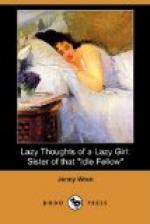People have different ideas of “Christmasing.” Some prefer to adopt an unsteady gait, and to spend the night in a ditch or a police-station; some have a taste for family parties; some like it better by themselves, and some go right away and spend the time at a different place every year. These last are, I think, by far the most sensible. It is a mistake to have land-marks to remind you how time is running on, how friends have left, how the loved ones have passed away. The vacant place appears even more empty. The old happy times show out even happier in contrast to the present. You cannot enjoy yourself or forget the past, for
“A sorrow’s crown of sorrow is remembering happier things.”
It is far better to go away somewhere to places which recall no sorrows or recollections and have no associations with the years gone by.
He is growing such a foolish old man is Father Christmas. He rarely visits us now with hoary head, his garments sparkling with frost and snow. He is tired of all that. He likes a change of fashion, like everybody else. He either comes so thickly enveloped in yellow fog that you can scarcely distinguish the old man, or else he arrives so drenched with rain and splashed up to the beard in mud that we scarcely like to open our doors to him.
He is growing old, I suppose, and trembling on the brink of second childhood, so we must not blame him. But still he is not a very great favorite of mine, and I cannot refrain from echoing the complaint in one of the comic papers—“Why doesn’t he strike, like the rest?”
CHAPTER VII.
ON THE COUNTRY.
At which season, I wonder, is the country most lovely, most enjoyable! Is it in the spring, with its richly-colored carpet, its young green leaves, its delicious perfumes, its glorious freshness? Ah, why cannot we, like the trees, put off our old sinful world-steeped habits, and year by year bud out in purest innocence once again? The hedges, but a week ago barren and bare, are now clothed in brightest apparel, the greenest of cloaks thrown over them, lifting up their heads and sharing in the general rejoicing, in the glory of their annual resurrection. Is it in summer, with its myriads of blooms, and its thousand thousand happy voices, the silent torpid river, basking in the light of the sun, and responding only to the fishes as they frisk near the surface? Or is it in the autumn, with its many shades, with its long avenues on which nature has lavished whole tubes of burnt sienna and vermilion; when you tread on gorgeous paths heavy with golden leaves? Oh, why are we not as lovely in our autumn of life as nature is in hers? Why, when she decks herself in the gayest coloring, do we don our soberest garb? We do not gain in splendor as we grow older. We lose our beauties and our charms one by one, till at last we stand destitute. Oh, cruel Time to treat us so!




